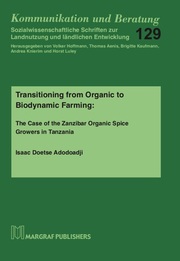-
Zusatztext
-
In recent years, biodynamically produced foods have gained a great deal of public attention; they are listed in the retail trade as premium products and stand for a special quality of production among customers. Thus, the brand 'demeter' has developed into a label known far beyond the organic trade public, which is associated with a special attention to ecolog- ical aspects in agricultural production. Biodynamic farming thus opens up new or improved market access for producers, not only for commonly used staple foods, but for all foods that are produced and certified according to the standards. Thus, this growing demand also cre- ates new market opportunities for agricultural producers in the global South. Historically, biodynamic agriculture developed in German-speaking countries, and the spe- cific practices, cultivation methods and fertilization procedures were first developed and tested in Central European locations and climates. Further dissemination initially took place in temperate zones, while biodynamic agriculture is still a relatively recent phenomenon in the tropics and subtropics. Farmers who want to use this production method in the global South have to get active and become innovative, they need to acquire and apply the new knowledge and appropriate practices for the respective location and crops. Due to the afore- mentioned location differences, sometimes significant adaptation efforts are required to ef- fectively integrate the new practices into the respective farm systems. Agricultural education and advisory services can be supportive and contribute to the innovation process. Isaac Adodoadji has studied an example of such an innovation process in the case of spice production by smallholders in Zanzibar. Here, a group of smallholders already involved in organic spice crop production has taken the opportunity of a public-private partnership to convert their production of cloves, pepper, vanilla, cinnamon, etc. and transition to the biodynamic way of practice. If the products are produced and certified according to the guidelines, European market access is made possible and significantly higher prices can be achieved. In practice, such a conversion is a process of several years and concerns not only the individual farmers, but the group as a whole, which together wants to supply the certified products.
-
Detailansicht
Transitioning from Organic to Biodynamic Farming
The Case of theZanzibar Organic Spice Growers in Tanzania, Kommunikation und Beratung 129
ISBN/EAN: 9783823618003
Umbreit-Nr.: 5669792
Sprache:
Englisch
Umfang: 174 S.
Format in cm:
Einband:
Paperback
Erschienen am 01.05.2022
Auflage: 1/2022


